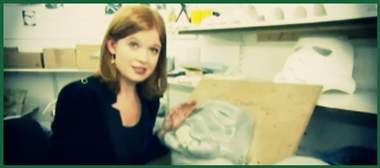Bloomberg today published a video report on the Lucasfilm Ltd. vs. Andrew Ainsworth dispute. After Ainsworth prevailed in the UK Court of Appeals in late 2009, the case was argued before the UK Supreme Court in early March. Mr. Ainsworth features prominently while giving a tour of his studio; Lucasfilm is represented by a two sentence written statement. While the short broadcast captures an interesting mainstream media perspective of the case, it lacks a substantive review of the two specific legal issues under consideration in the pending UK Supreme Court decision, noting that “the legal arguments are detailed and complex“.
The full video can be viewed directly at www.bloomberg.com or in the player below:
Bloomberg’s Louise Beale reports that “Ainsworth sells his stomtrooper suits for up to £1500 each, but claims that this battle is not about the money“.
In the segment, Ainsworth states:
All I want is the principal of being able to make what I create myself. There shouldn’t be anybody in this world to be able to stop you being creative, or use your hands or your knowledge to do what you do for a living.
While there is ongoing debate over who contributed to the creation of the iconic stormtrooper character and how they did so – from two to three dimensional designs, to “prototypes”, to various sculpts and original sculpting, etc. – there is no disputing that Mr. Ainsworth produced the final, actual stormtrooper props/costumes worn in Star Wars: A New Hope. Mr. Ainsworth also offers for sale on his website replica stormtrooper blaster props, which is a prop which he did not himself create, nor contribute to the original design or manufacture for the film (see Shepperton Design Studios Expands Line of “Post Lawsuit” Unlicensed Replica Star Wars Props).
The statement below was provided to Bloomberg by Lucasfilm:
The imaginative characters, props, costumes, and other visual assets that go into making a film are the creative works of artists in the U.K. and worldwide. These works of art should receive the full protection of U.K. copyright law, just as they do in the rest of the world. The U.K. should not allow itself to become a safe haven for piracy.
Beale closes stating that “with many film studios relying on film merchandising to make money, it won’t just be George Lucas interested in the outcome of this case“.
All related articles can be found below:
Jason DeBord


